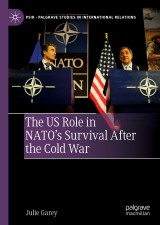Details

The US Role in NATO's Survival After the Cold War
Palgrave Studies in International Relations
|
90,94 € |
|
| Verlag: | Palgrave Macmillan |
| Format: | |
| Veröffentl.: | 14.06.2019 |
| ISBN/EAN: | 9783030136758 |
| Sprache: | englisch |
Dieses eBook enthält ein Wasserzeichen.
Beschreibungen
<p>This book takes a new approach to answering the question of how NATO survived after the Cold War by examining its complex relationship with the United States. A closer look at major NATO engagements in the post-Cold War era, including in the Balkans, Afghanistan, Iraq, and Libya, reveals how the US helped comprehensively reshape the alliance. In every conflict, there was tension between the United States and its allies over mission leadership, political support, legal precedents, military capabilities, and financial contributions. The author explores why allied actions resulted in both praise and criticism of NATO’s contributions from American policymakers, and why despite all of this and the growing concern over the alliance’s perceived shortcomings the United States continued to support the alliance. In addition to demonstrating the American influence on the alliance, this works demonstrates why NATO’s survival is beneficial to US interests.</p><div><br></div>
<div>1. Chapter 1: Introduction</div><div><br></div><div>2. Chapter 2: Alliances, NATO, and the Post-Cold War Era </div><div><br></div><div>3. Chapter 3: The 1999 Kosovo Intervention </div><div><br></div><div>4. Chapter 4: September 11, 2001 and the War in Afghanistan </div><div><br></div><div>5. Chapter 5: The 2003 Iraq War </div><div><br></div><div>6. Chapter 6: The 2011 Libyan Intervention </div><div><br></div><div>7. Chapter 7: The Evolution and Persistence of NATO </div><div><br></div><div>8. Chapter 8: The United States and Multilateralism </div><div><br></div>
<b>Julie Garey</b> is an Assistant Teaching Professor of political science at Northeastern University in Boston, Massachusetts, USA<div><br></div>
<div><p>This book takes a new approach to answering the question of how NATO survived after the Cold War by examining its complex relationship with the United States. A closer look at major NATO engagements in the post-Cold War era, including in the Balkans, Afghanistan, Iraq, and Libya, reveals how the US helped comprehensively reshape the alliance. In every conflict, there was tension between the United States and its allies over mission leadership, political support, legal precedents, military capabilities, and financial contributions. The author explores why allied actions resulted in both praise and criticism of NATO’s contributions from American policymakers, and why despite all of this and the growing concern over the alliance’s perceived shortcomings the United States continued to support the alliance. In addition to demonstrating the American influence on the alliance, this works demonstrates why NATO’s survival is beneficial to US interests.</p>
<p><b>Julie Garey</b> is an Assistant Teaching Professor of political science at Northeastern University in Boston, Massachusetts, USA</p><br></div>
<p><b>Julie Garey</b> is an Assistant Teaching Professor of political science at Northeastern University in Boston, Massachusetts, USA</p><br></div>
<p>Develops a more robust understanding of the US role in NATO</p><p>Argues the causes of NATO’s persistence after the Cold War</p><p>Provides deeper historical and political understandings of post-Cold War conflict engagements</p>
Diese Produkte könnten Sie auch interessieren:

Inclusión educativa de niños, niñas y adolescentes migrantes venezolanos, en Colombia

von: Douglas Jiménez

15,99 €
















